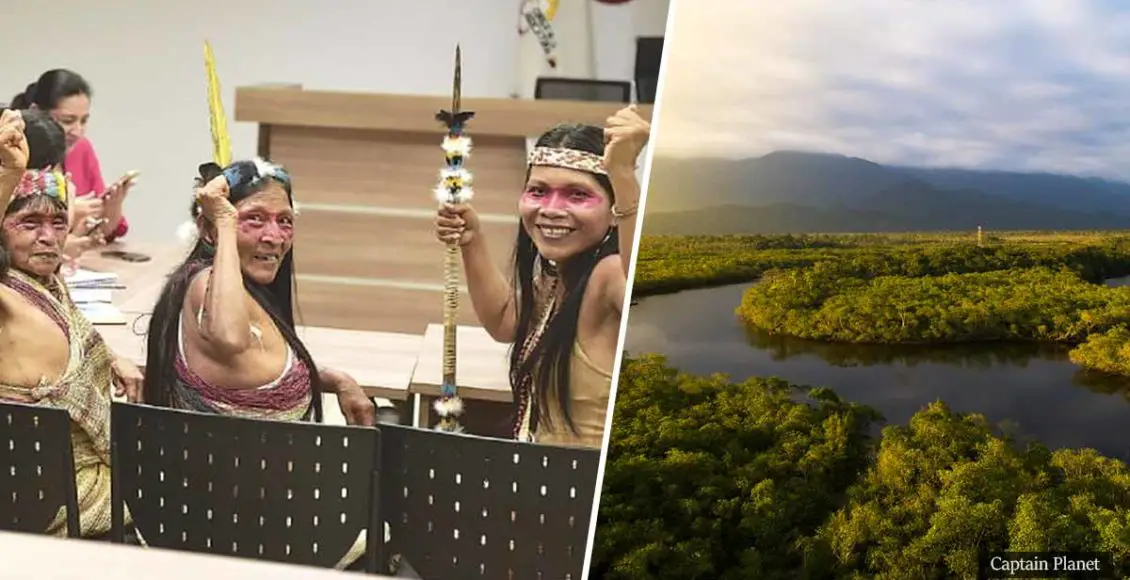Renewable energy sources are super cool and green energy is downright awesome! Unfortunately, we still live in a petrol-driven world, which is made to go round by Petrodollars. But the gas we fill up the tank with every day comes at a price, and for some it is much higher than the money we pay at the gas station.
A modern-day David vs Goliath story
Ironically, people who’ve never had a car in their life appear to be the worst affected by our insatiable appetite for crude oil.
As UNILAD’s Julia Banim reports, an Amazon tribe has won a huge lawsuit against big oil consortium, saving vast acres of precious rainforest by doing so.
Wow, that a modern-day tale of David versus Goliath, so to say! In this case, the part of Goliath has been assumed by the Ecuadorian government, who planned to prospect for crude oil throughout seven million acres of South-Central Ecuadorian Amazon.
The implacable petrodollar-fueled machine has been stopped by a tiny David: the indigenous Waorani people – a tiny local tribe living on villages in parts of the rainforest that have no roads.
Justice dispensed
Sometimes, however, the power of law prevails over the laws made by the powerful of the day. In this case, the Waorani people of Pastaza have won a historic court ruling and have managed to protect half a million acres of their homeland – the Amazon rainforest.
The court also ruled against the the contemplated by the government auctioning of sixteen oil blocks covering more than seven million acres of pristine rainforest.
Their legal battle started in February this year, when a group of representatives of the Waorani people, together with Ecuador’s Ombudsman, a parliament-appointed official who serves as a public advocate, filed a lawsuit against the Ecuadorian government for not properly consulting with them before endorsing potential oil exploration in their territory.
The Ecuadorian government’s deceitful tactics
The main argument in their defense was the Waorani’s claim that the government had not properly informed their community about the oil auction. In their words, representatives from Ecuador’s Ministry of Energy and Nonrenewable Resources came to her village in 2012, seeking community members’ consent for the auction, but most of them were out on a hunting trip at the time and didn’t meet with them.
Executive Director of Amazon Frontlines, Mitch Anderson, has stated:
“This is a major precedent for indigenous rights across the Amazon. Today, the court has recognized a pattern of deceit, bad-faith and manipulative tactics in the Ecuadorian Government’s attempt to earmark the Waorani people’s lands for oil extraction.
This is a huge step forward in the battle to ensure indigenous people’s rights over their lands are respected. Guaranteeing indigenous peoples’ rights to decide over their future and to say ‘No’ to destructive extractive projects is key to protecting the Amazon rainforest and halting climate change.”
The court ruling is a legal precedent in Ecuador
The ruling, passed by a three-judge panel of the Pastaza Provincial Court, sets a key legal precedent for indigenous people’s rights, as well as for rainforest protection.
Spokesperson for the Waorani of Pastaza, Oswando Nenquimo, has made the following statement:
“Today we have protected our forest from oil drilling; we have protected our water from contamination; we have protected our children from sickness. This is a legal precedent for indigenous rights,
But the fight is far from over. The government will appeal because they still want the oil beneath our land. Indigenous Nations across the Amazon and the world must band together to protect our homes.”
In an interview with The New Yorker, Waorani leader Nemonte Nenquimo said:
“The court recognized that the government violated our right to live free, and make our own decisions about our territory and self determination,
Our territory is our decision, and now, since we are owners, we are not going to let oil enter and destroy our natural surroundings and kill our culture.
How wonderful it is to hear some positive news for once about the fate of the Amazon rainforest.”
As this legal saga is far from over, we can only hope that the Waorani people’s right to manage their land as they see appropriate will be confirmed at a second instance. In any case, this is a serious test for the rule of law and democracy in Ecuador.



